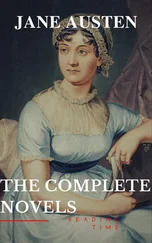The change which a few hours had wrought in the minds and the happiness of the Dashwoods, was such — so great — as promised them all, the satisfaction of a sleepless night. Mrs. Dashwood, too happy to be comfortable, knew not how to love Edward, nor praise Elinor enough, how to be enough thankful for his release without wounding his delicacy, nor how at once to give them leisure for unrestrained conversation together, and yet enjoy, as she wished, the sight and society of both.
Marianne could speak HER happiness only by tears. Comparisons would occur — regrets would arise — and her joy, though sincere as her love for her sister, was of a kind to give her neither spirits nor language.
But Elinor — how are HER feelings to be described? — From the moment of learning that Lucy was married to another, that Edward was free, to the moment of his justifying the hopes which had so instantly followed, she was every thing by turns but tranquil. But when the second moment had passed, when she found every doubt, every solicitude removed, compared her situation with what so lately it had been — saw him honourably released from his former engagement, saw him instantly profiting by the release, to address herself and declare an affection as tender, as constant as she had ever supposed it to be — she was oppressed, she was overcome by her own felicity — and happily disposed as is the human mind to be easily familiarized with any change for the better, it required several hours to give sedateness to her spirits, or any degree of tranquillity to her heart.
Edward was now fixed at the cottage at least for a week — for whatever other claims might be made on him, it was impossible that less than a week should be given up to the enjoyment of Elinor’s company, or suffice to say half that was to be said of the past, the present, and the future — for though a very few hours spent in the hard labor of incessant talking will despatch more subjects than can really be in common between any two rational creatures, yet with lovers it is different. Between THEM no subject is finished, no communication is even made, till it has been made at least twenty times over.
Lucy’s marriage, the unceasing and reasonable wonder among them all, formed of course one of the earliest discussions of the lovers — and Elinor’s particular knowledge of each party made it appear to her in every view, as one of the most extraordinary and unaccountable circumstances she had ever heard. How they could be thrown together, and by what attraction Robert could be drawn on to marry a girl, of whose beauty she had herself heard him speak without any admiration — a girl too already engaged to his brother, and on whose account that brother had been thrown off by his family — it was beyond her comprehension to make out. To her own heart it was a delightful affair, to her imagination it was even a ridiculous one, but to her reason, her judgment, it was completely a puzzle.
Edward could only attempt an explanation by supposing, that, perhaps, at first accidentally meeting, the vanity of the one had been so worked on by the flattery of the other, as to lead by degrees to all the rest. Elinor remembered what Robert had told her in Harley Street, of his opinion of what his own mediation in his brother’s affairs might have done, if applied to in time. She repeated it to Edward.
“THAT was exactly like Robert,”— was his immediate observation. —”And THAT,” he presently added, “might perhaps be in HIS head when the acquaintance between them first began. And Lucy perhaps at first might think only of procuring his good offices in my favour. Other designs might afterward arise.”
How long it had been carrying on between them, however, he was equally at a loss with herself to make out; for at Oxford, where he had remained for choice ever since his quitting London, he had had no means of hearing of her but from herself, and her letters to the very last were neither less frequent, nor less affectionate than usual. Not the smallest suspicion, therefore, had ever occurred to prepare him for what followed — and when at last it burst on him in a letter from Lucy herself, he had been for some time, he believed, half stupified between the wonder, the horror, and the joy of such a deliverance. He put the letter into Elinor’s hands.
“DEAR SIR,
“Being very sure I have long lost your affections, I have thought myself at liberty to bestow my own on another, and have no doubt of being as happy with him as I once used to think I might be with you; but I scorn to accept a hand while the heart was another’s. Sincerely wish you happy in your choice, and it shall not be my fault if we are not always good friends, as our near relationship now makes proper. I can safely say I owe you no ill-will, and am sure you will be too generous to do us any ill offices. Your brother has gained my affections entirely, and as we could not live without one another, we are just returned from the altar, and are now on our way to Dawlish for a few weeks, which place your dear brother has great curiosity to see, but thought I would first trouble you with these few lines, and shall always remain,
“Your sincere well-wisher, friend, and sister,
“LUCY FERRARS.
“I have burnt all your letters, and will return your picture the first opportunity. Please to destroy my scrawls — but the ring with my hair you are very welcome to keep.”
Elinor read and returned it without any comment.
“I will not ask your opinion of it as a composition,” said Edward. —”For worlds would not I have had a letter of hers seen by YOU in former days. — In a sister it is bad enough, but in a wife! — how I have blushed over the pages of her writing! — and I believe I may say that since the first half year of our foolish — business — this is the only letter I ever received from her, of which the substance made me any amends for the defect of the style.”
“However it may have come about,” said Elinor, after a pause — “they are certainly married. And your mother has brought on herself a most appropriate punishment. The independence she settled on Robert, through resentment against you, has put it in his power to make his own choice; and she has actually been bribing one son with a thousand a-year, to do the very deed which she disinherited the other for intending to do. She will hardly be less hurt, I suppose, by Robert’s marrying Lucy, than she would have been by your marrying her.”
“She will be more hurt by it, for Robert always was her favourite. — She will be more hurt by it, and on the same principle will forgive him much sooner.”
In what state the affair stood at present between them, Edward knew not, for no communication with any of his family had yet been attempted by him. He had quitted Oxford within four and twenty hours after Lucy’s letter arrived, and with only one object before him, the nearest road to Barton, had had no leisure to form any scheme of conduct, with which that road did not hold the most intimate connection. He could do nothing till he were assured of his fate with Miss Dashwood; and by his rapidity in seeking THAT fate, it is to be supposed, in spite of the jealousy with which he had once thought of Colonel Brandon, in spite of the modesty with which he rated his own deserts, and the politeness with which he talked of his doubts, he did not, upon the whole, expect a very cruel reception. It was his business, however, to say that he DID, and he said it very prettily. What he might say on the subject a twelvemonth after, must be referred to the imagination of husbands and wives.
That Lucy had certainly meant to deceive, to go off with a flourish of malice against him in her message by Thomas, was perfectly clear to Elinor; and Edward himself, now thoroughly enlightened on her character, had no scruple in believing her capable of the utmost meanness of wanton ill-nature. Though his eyes had been long opened, even before his acquaintance with Elinor began, to her ignorance and a want of liberality in some of her opinions — they had been equally imputed, by him, to her want of education; and till her last letter reached him, he had always believed her to be a well-disposed, good-hearted girl, and thoroughly attached to himself. Nothing but such a persuasion could have prevented his putting an end to an engagement, which, long before the discovery of it laid him open to his mother’s anger, had been a continual source of disquiet and regret to him.
Читать дальше












